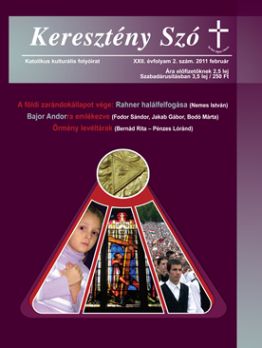Zarándokutunk vége
The Endpoint of Our Pilgrimage
Author(s): István NemesSubject(s): Christian Theology and Religion
Published by: VERBUM Keresztény Kulturális Egyesület
Keywords: death; Karl Rahner; theology
Summary/Abstract: The study deals with the interrelated topics of free will and death in Karl Rahner’s theology. Rahner, one of the most influential theologists of the 20th century made known his name by building up his theology on the basis of modern anthropology and Joseph Maréchal’s transcendental method. Thus, the free will is seen by the German theologian as a fundamental transcendental structure of human spirit. In its essence the free will has the function to realize the human person by its decisions. Through these decisions – including the so called fundamental decision, which gives to every particular human act the same final direction – the free will holds together the human character and the person, and makes it first a really one and definitive entity, in spite of its spreadness in time and space during a human lifetime. Thus the free will gives people in fact not the ability of change, but the one of permanence and definitivity in time and space. At this point the free will has a strange, but logic inner convergence with the event of dying. The death of the man is the event by which human person becomes a definitive entity, by loosing its capacity to perform any further decisions – as the church taught us. Characteristic to his way of thinking, Rahner turns this well known teaching of the church upside down without denying its validity. He says that death – if we really consider it a part of our life – cannot be only an event, which breaks into our life from outside, leaving the human person totally helpless. If man is a being blessed with the gift of the free will, then free will must have its last word to say even in the final event of dying. Thus the death of the man is a final, purely recapitulative and supreme act of the free will, by means of which it realizes the upper described definitivity and unity of the whole human person. With other words: death really is an external necessity suffered by all of us, but also is the final and supreme act of our free will. It consists necessarily of these two elements that build up a dialectical unity of contraries. Our study proposes to enlighten this inner relationship between free will and death, and tries to connect the topic to the Christian hope, which opens first any kind of option for a Christian way of bringing decisions.
Journal: Keresztény Szó
- Issue Year: XXII/2011
- Issue No: 02
- Page Range: 2-8
- Page Count: 7
- Language: Hungarian

